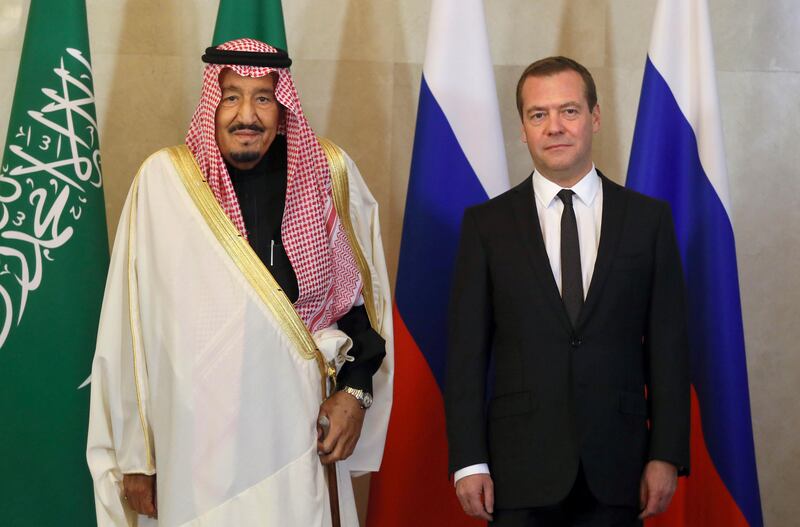Saudi Arabia’s King Salman was due to leave Moscow on Saturday after a historic four-day visit that symbolised the rapidly closening ties between Riyadh and Russia.
Ahead of his departure, King Salman was awarded an honorary doctorate by the Moscow State Institute of International Relations, which is run by the Russian foreign ministry.
King Salman, the first ruling Saudi monarch to pay an official visit to Moscow, met with Russian president Vladimir Putin in the Kremlin on Thursday, before holding talks with prime minister Dmitry Medvedev on Friday.
Over 15 co-operation agreements were closed during the 81-year-old’s visit, including in oil, military, and space exploration. The Saudis also announced they would purchase Russia’s S-400 defence system, in a move that signalled a departure from Riyadh’s long-established practice of purchasing arms from western countries.
On Saturday, Saudi minister of environment, water and agriculture Abdulrahman bin Abdulmohsen Al Fadhli met with his Russian counterpart, Aleksandr Tkachev, the official Saudi Press Agency (Spa) said. During the meeting, the two men discussed increased co-operation on agriculture and the export of Russian agricultural products to the kingdom, including grain and livestock.
_______________
Read more:
[ Saudi Aramco signs five agreements with Russian companies ]
[ US approves $15 billion missile sale to Saudi Arabia ]
[ Saudi Arabia and Russia to extend co-operation beyond energy to defence and Syria peace ]
_______________
Sergey Lavrov, the Russian foreign minister, hailed King Salman’s visit as marking a new level in Russian-Saudi ties.
The head of the Russian Direct Investment Fund, Kirill Dmitriev, meanwhile said the visit had been a success, Spa reported on Saturday.
King Salman and Mr Putin "discussed a number of issues and topics of common interest to the Kingdom, Russia and the region of the Middle East as well as economic and investment cooperation between us and they agreed on a number of important agreements such as military co-operation," he said.
Mr Dmitriev thanked King Salman and Saudi Crown Prince Mohammed bin Salman for their efforts in improving and developing relations with Russia.
Russian state media said the visit represented a recognition by Riyadh that Moscow’s influence is on the rise in the Middle East after Mr Putin’s military intervention in Syria changed the balance of power in favour of president Bashar Al Assad. Saudi Arabia is backing rebel groups in Syria.
King Salman insisted in Moscow that Iran, which is allied with Russia in Syria, ends its “interference” in the Gulf and the wider Middle East. The Saudis are also angry over Iranian backing for the Houthi rebels in Yemen.
“We emphasise that the security and stability of the Gulf region and the Middle East is an urgent necessity for achieving stability and security in Yemen. This would demand that Iran give up interference with the internal affairs of the region, to give up actions destabilising the situation in this region,” King Salman said at the Kremlin.
But the Saudi king made no mention of Riyadh's long-held position that Mr Al Assad would have to step down before any peace deal could be reached in Syria. Mr Lavrov said during the visit that Saudi Arabia had expressed its support for a Russian-backed plan to establish so-called "de-escalation" zones in Syria with the support of Iran and Turkey. Riyadh had previously been opposed to the plan because of Iran's role.
"Russia realises that there can be no peace in Syria without some kind of mutual understanding with Saudi Arabia," Fyodor Lukyanov, who heads the Council on Foreign and Defence, a Kremlin advisory group, told The National. "Negotiations over the king's visit dragged on for some time, but they finally worked out."
King Salman’s visit also gave a boost to world oil prices, vital for both Moscow and Riyadh, when Mr Putin said Russia was open to extending a deal to cap production to the end of 2018. The agreement was due to expire in March 2018. Oil rose after Mr Putin’s statement.






